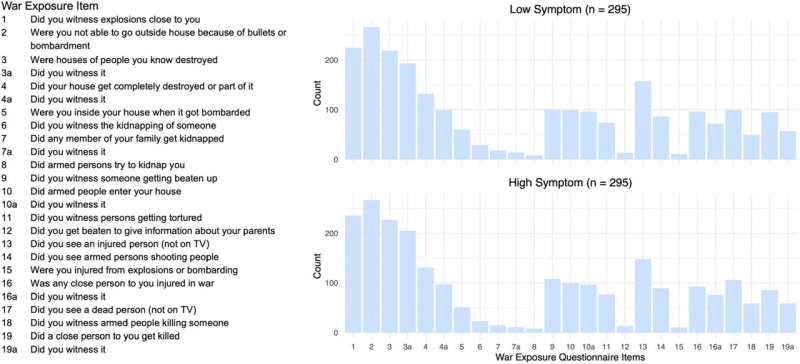Only one in five Syrian children in refugee camps show resilience to mental health problems

Many more Syrian children living in refugee camps appear to be living with mental health problems than previously thought, according to new in-the-field research led by Queen Mary University of London.
The team behind the research say that children and their families in such challenging environments need more support.
They surveyed more than 1,500 children in camps in Lebanon—all of them refugees from the war in Syria. Their aim was to investigate what made some children resilient to mental health problems, despite having experienced war trauma.
The majority (84%) of the children had experienced bombings, 37% experienced more direct interpersonal violence such as witnessing torture, and 44% said that someone close to them was killed.
Based on previous research, the researchers estimated that half the children in their sample would meet their criteria for resilience. But in their results less than one in five of the children were resilient.
Dr. Michael Pluess, professor in psychology at Queen Mary, said, "Our study is unique in that we collected data from refugee children living just across the border from Syria, whereas many other studies tend to be based on refugees that resettled in high income countries."
"We also carefully matched children with and without mental health problems based on their specific experience of war, and we considered different mental health problems simultaneously rather than only focusing on one (such as solely looking at post-traumatic stress or depression). This allowed us to investigate refugee children's resilience more rigorously than in previous studies."
"The finding that about 20% of children remain resilient despite the experience of war and displacement is definitely remarkable. At the same time, it is deeply concerning that the majority of children are at risk for mental health problems. Clearly, more needs to be done to support refugee children—especially those living in the challenging environment of refugee camps."
The research shows how the child's current environment affects their ability to recover or not from the war trauma they'd experienced.
The team—which also interviewed the children's primary caregivers—found the children weren't just suffering from the aftermath of war, but from problems experienced within the camps. These included bullying and loneliness, while the mental health of caregivers themselves and how they interacted with their child was also particularly important.
First author Cassandra Mani Popham, Ph.D. researcher at Queen Mary University of London, said, "Individual therapy and coping strategies can only go so far. Our results show there needs to be emphasis on supporting the whole family, to give children a better chance of adapting in the extremely difficult conditions of camps. We need to look at how the systems they are part of can support them—for example by providing stable shelter, proper resources, and access to education, as well as support for parents who are—unsurprisingly—struggling as well."
Professor Michael Pluess said, "Our research shows that resilience is not simply an attribute of the individual. Although individual characteristics of the children contribute to their resilience, the support they receive from their families and communities is also crucial. In order to help these children, we need to also support their families and try to reduce the significant challenges they face by living in refugee camps."
Questionnaire data for the study was collected via interviews in the children's homes in the settlements in the Beqaa region of Lebanon in 2017–2019. The interviews were conducted by a team of 16 trained interviewers, in Arabic. More information on the study methodology.
This research follows a previous paper by the same authors that looked at mental health in Syrian children across two points in time and found that nearly 25% showed improvement—demonstrating that with the right support refugee children traumatized by war can recover well.
More information: Cassandra M. Popham et al, Predictors of psychological risk and resilience among Syrian refugee children, Journal of Child Psychology and Psychiatry (2022). DOI: 10.1111/jcpp.13670
Fiona S. McEwen et al, Cohort profile: biological pathways of risk and resilience in Syrian refugee children (BIOPATH), Social Psychiatry and Psychiatric Epidemiology (2022). DOI: 10.1007/s00127-022-02228-8



















